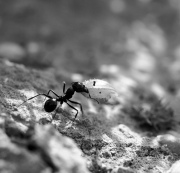Tags
Bacteria, brain, consciousness, evolution, gender, Genetics, Good Men Project, memory, mental illness, photography, pink, science, science and society, Science in Society, scultpture, sexism
 January has been a busy month. In addition to writing here, I worked on some websites for my family and submitted entries to a couple of science writing competitions for the first time! I’ve also optimistically nominated Inspiring Science for the annual “Bloggies” awards; if you think it deserves a chance, why not head on over and add your voice? I’ve really enjoyed working on this blog for the past year and I’m looking forward to writing being an even bigger part of my life in 2013! Anyway, here’s another batch of tidbits I found during my wanderings. As always, feel free to add more links in the comments.
January has been a busy month. In addition to writing here, I worked on some websites for my family and submitted entries to a couple of science writing competitions for the first time! I’ve also optimistically nominated Inspiring Science for the annual “Bloggies” awards; if you think it deserves a chance, why not head on over and add your voice? I’ve really enjoyed working on this blog for the past year and I’m looking forward to writing being an even bigger part of my life in 2013! Anyway, here’s another batch of tidbits I found during my wanderings. As always, feel free to add more links in the comments.
- Neuroskeptic writes about how a neurological disorder can be mistaken for a psychological condition.
- What happens when you mix lots of scents together? Apparently, it smells white.
- More from Neuroskeptic: a new model of how short-term memory works.
- Scientists studying the link between attention and perception discovered that your brain retroactively edits your awareness.
- If you missed it at the end of my last post, you should really read Stephen Jay Gould’s essay about Earth, the Planet of the Bacteria.
- A moving piece about amnesia and identity by Daniel Levitin.
- Alfred Russel Wallace was a major 19th century scientist and co-discoverer of evolution by natural selection. To celebrate the centennial of his death, the British Natural History Museum has put up an archive of correspondence, the Wallace Letters Online.
- Neuroskeptic again, this time about our (mistaken) impression that mentally ill people are more dangerous. If you’re interested in this kind of thing, you should follow his blog.
- “Why can’t boys like pink, too?” asks Dr. Laurie Petrou. And here’s a wonderful story about a boy who does, from the excellent blog Raising My Rainbow.
- Emily Heist Moss writes “[d}espite parents of the you-can-be-anything-you-want persuasion, even I absorbed the misguided notion that math and science were not going to play a role in my future,” in her piece about how our society imprints expectations on boys and girls.
- Is there really a difference in sex drive between men and women?
- An op-ed on Al Jazeera English discussing the political paralysis in Washington, DC.
- Some amazing and entertaining “urban interventions” by French street artist OaKoAk.
- Photographer Amery Carlson used a long exposure to capture multiple lightning strikes off a coastal town.
- Jonty Hurwitz describes himself as “an artist scientist archetype”. It’s difficult to describe his warped, anamorphic sculptures other than to say that they’re brilliant and you should go have a look.
- Everyone knows you shouldn’t believe everything you read, but here’s an impressive reminder: an invented 17th century conflict that persisted as a Wikipedia hoax for five year hoax .
- The admirable and amusing Sue Perkins looks into the real story behind The Sound of Music.
- Frank Bure’s essay on our stories about ourselves — how we build them and what they come to mean.
- A touching journal entry by Neil Gaiman about the death of his dog, Cabal. I love the way he writes!
- I don’t like linking to adverts, but this one really is excellent. Besides, it’s about the power of words so how could an aspiring writer resist?
- Noah St. John’s story-telling performance at NPR’s Snap Judgement. To be honest, I wish there hadn’t been any background music…but that’s just the way I am.
- Inspired by an xkcd comic, the Up-Goer Five text editor: you’re only allowed to use the thousand most common words in English. I’ve been meaning to write a post (or something) using this, but haven’t gotten to it yet.
That’s all from me!

Reblogged this on Oyia Brown.
Great links as usual! I started with the Neuroskeptic one. Interesting, but it semi-perpetuates the notion that mental diseases are different from neurological ones. In my view, they are one and the same in each and every case. It’s just that for some of them, we have not discovered the biological cause…